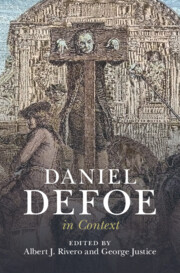Book contents
- Daniel Defoe in Context
- Daniel Defoe in Context
- Copyright page
- Contents
- Illustrations
- Notes on Contributors
- Preface
- Acknowledgements
- Chronology
- Part I Life and Works
- Part II Literary Context
- Part III Authorship and Copyright
- Part IV The Monarchy and Parliament
- Part V Social Structures and Social Life
- Chapter 23 The Penal System
- Chapter 24 Defoe and Religion
- Chapter 25 Social Status and Social Mobility
- Chapter 26 Education and Opportunity
- Chapter 27 Men and Women
- Chapter 28 Defoe and China
- Chapter 29 London, 1660–1731
- Chapter 30 The Environment
- Chapter 31 Marriage Law
- Chapter 32 Daniel Defoe and the Law of the Sea
- Chapter 33 Disability
- Chapter 34 Defoe and Colonialism
- Chapter 35 Defoe and Animals
- Chapter 36 Defoe and Slavery
- Chapter 37 Economics
- Chapter 38 Defoe and the Supernatural
- Chapter 39 Defoe and America
- Part VI Critical Fortunes and Literary Afterlife
- Further Reading
- Index
Chapter 27 - Men and Women
from Part V - Social Structures and Social Life
Published online by Cambridge University Press: 27 April 2023
- Daniel Defoe in Context
- Daniel Defoe in Context
- Copyright page
- Contents
- Illustrations
- Notes on Contributors
- Preface
- Acknowledgements
- Chronology
- Part I Life and Works
- Part II Literary Context
- Part III Authorship and Copyright
- Part IV The Monarchy and Parliament
- Part V Social Structures and Social Life
- Chapter 23 The Penal System
- Chapter 24 Defoe and Religion
- Chapter 25 Social Status and Social Mobility
- Chapter 26 Education and Opportunity
- Chapter 27 Men and Women
- Chapter 28 Defoe and China
- Chapter 29 London, 1660–1731
- Chapter 30 The Environment
- Chapter 31 Marriage Law
- Chapter 32 Daniel Defoe and the Law of the Sea
- Chapter 33 Disability
- Chapter 34 Defoe and Colonialism
- Chapter 35 Defoe and Animals
- Chapter 36 Defoe and Slavery
- Chapter 37 Economics
- Chapter 38 Defoe and the Supernatural
- Chapter 39 Defoe and America
- Part VI Critical Fortunes and Literary Afterlife
- Further Reading
- Index
Summary
When the heroine of Defoe’s Roxana defends her decision to remain single, she insists that the most salient distinction between men and women is essentially a political one: whether one can lay claim to rights to one’s self and one’s property. Roxana’s argument depends on the same theory of the interdependence of liberty and property that is central to John Locke’s articulation of political personhood in his Second Treatise of Government; but she echoes Locke only to expose the impossibility of reconciling this theory with the matrimonial imperative for women. Throughout his career, Defoe exposed how a husband’s authority over his wife could be perverted into murderous ’Tyranny and Oppression’. By placing the matrimonial relations of men and women in the larger context of the rights of political subjects, Defoe refused to participate in the construction of an ideal domestic sphere that insisted on its separation from the political realm.
Keywords
- Type
- Chapter
- Information
- Daniel Defoe in Context , pp. 228 - 234Publisher: Cambridge University PressPrint publication year: 2023

